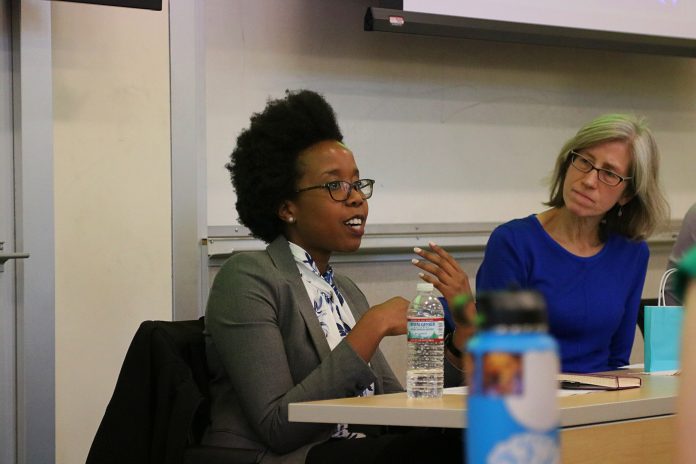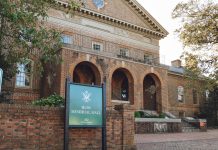
Friday, Feb.15, the Social Science Research Methods Center at the College of William and Mary hosted a panel on ethics in political science with guest speaker Kelebogile Zvobgo as well as government professor Paula Pickering and the GRI’s Director of the Center for African Development, Philip Roessler.
Zvobgo is currently pursuing her doctorate at the University of Southern California, and her research focuses on human rights and political violence. Pickering’s research focuses on democratization in Eastern Europe, and she assists with facilitating the American-Bosnian Collaboration Project in the Global Research Institute. Roessler primarily researches African politics, conflict, state-building and development.
The discussion centered around obligations to research participants, the practices of partaking in safe research and the importance of protecting faculty, students and locals alike throughout the research process. The speakers first discussed the balance and tradeoffs between partaking in ethical, safe research and discovering answers to challenging questions.
Roessler acknowledged that it can be hard to create knowledge while keeping participants out of harm’s way.
“There’s a tradeoff between doing nothing and doing this research,” Roessler said. “So the big tradeoff is do nothing, and then you’re safe; you’re not harming anyone, but we’re not also better understanding how the world works. We’re not co-creating knowledge with people in these countries in which we work.”
“There’s a tradeoff between doing nothing and doing this research,” Roessler said. “So the big tradeoff is do nothing, and then you’re safe; you’re not harming anyone, but we’re not also better understanding how the world works. We’re not co-creating knowledge with people in these countries in which we work.”
Zvobgo discussed one of her recent pieces regarding a coup in Zimbabwe. Zvobgo acknowledged how she had been privileged to live in the United States for such a long period of time and had forgotten how easily she could risk her safety by calling out autocrats. In response, Zvobgo attained her American citizenship, so she could continue expressing her viewpoint in her research.
Pickering emphasized the importance of acknowledging one’s own privilege during research, as someone who is free to leave, unlike the locals who could be at risk due to participating in academic research. She discussed examples of this during her time research in Bosnia and Herzegovina, where she had to be careful in which locals she spoke with in order to minimize their risk.
“It’s not your safety that you have to be thinking about,” Pickering said, “It’s always the safety of the local people that you’re asking to give you information, and you have almost nothing to give them back that is useful to them. Nothing.”
“It’s not your safety that you have to be thinking about,” Pickering said, “It’s always the safety of the local people that you’re asking to give you information, and you have almost nothing to give them back that is useful to them. Nothing.”
Pickering and Roessler both spoke to the intensive process of community-based research when students are involved. Local languages present challenges for these students, but their intrigue and fascination lend positively to the research process. There is also emphasis not only on the research but also on incorporating other opportunities to immerse students in these cultures and different countries.
The third and final question requested a follow up to discuss how professors should deal with the fairness and safety of certain students of others depending on gender, race and sexual orientation.
“There’s definitely a gender component as well,” Zvobgo said. “I need a male chaperone to go into the field some places, and that’s just the reality of keeping yourself and your participants safe, which is patriarchy goes global.”
“There’s definitely a gender component as well,” Zvobgo said. “I need a male chaperone to go into the field some places, and that’s just the reality of keeping yourself and your participants safe, which is patriarchy goes global.”
Zvobgo asserted that it’s extremely important to keep yourself, your team and your participants safe, and dealing with these frustrating circumstances is necessary to do so.
Pickering went on to explain that she never puts her students into vulnerable, unsafe positions, and tries to avoid putting locals into that scenario as well.
“Always if you have questions, my main message is you have to have consultation with the locals,” she said. “Always ask local peoples at every stage of your research process, before you go, when you’re writing your interview questions because you have no idea, honestly.”
She emphasized how important it is to be cautious about what sort of questions you are asking, as well as their implications, in addition to following local protocol and maintaining connection with them in order to ensure you are staying within proper social boundaries.
Roessler reiterated Pickering’s point and said that it is of utmost importance to be cautious in questioning and to even take time to lay a foundation between a researcher and their participant, especially when dealing with sensitive topics.
Roessler even recounted an instance in which he dove into questioning too early, leading to a hostile exchange in which African officers pulled their guns, as they felt threatened. Roessler asserted that these protocols are extremely important not only in maintaining ethical behavior, but in ensuring everyone’s safety as well.
“We’ve had to shift projects, shift the environment, if it becomes hostile for doing the project,” Roessler said. “At the end of the day, no project is worth those risks, so you put a lot on hold.”
Correction: A previous version of this article incorrectly stated that the Global Research Institute hosted the panel on ethics in political science. The article has been corrected to clarify that the Social Science Research Methods Center hosted the event.

































